Exterior lighting controls
Control stalk for the selection and control of the various front and rear lamps providing the vehicle's lighting.
Main lighting
The various front and rear lamps of the vehicle are designed to adapt the driver's visibility progressively in relation to the climatic conditions:
- sidelamps, to be seen,
- dipped beam headlamps to see without dazzling other drivers,
- main beam headlamps to see clearly when the road is clear.
Additional lighting
Other lamps are fitted to fulfil the requirements of particular driving conditions:
- a rear foglamp to be seen from a distance,
- front foglamps for even better forward vision,
- directional headlamps for improved visibility when cornering,
- daytime running lamps to be seen during the day.
Settings
Various automatic lighting control modes are also available depending on options:
- daytime running lamps,
- automatic illumination of headlamps,
- directional lighting,
- guide-me-home lighting.
Model without AUTO lighting
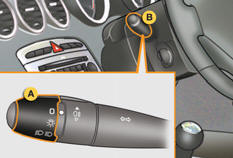
Model with AUTO lighting
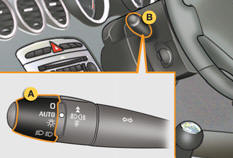
Manual controls
The lighting is controlled directly by the driver by means of the ring A and the stalk B .
A. Main lighting mode selection ring:
turn it to position the symbol required facing the mark.
 Lamps off.
Lamps off.
 Automatic illumination of headlamps.
Automatic illumination of headlamps.
 Sidelamps.
Sidelamps.
 Dipped headlamps or main beam headlamps.
Dipped headlamps or main beam headlamps.
B. Stalk for switching headlamps: pull the stalk towards you to switch the lighting between dipped and main beam headlamps.
In the lamps off and sidelamps modes, the driver can switch on the main beam headlamps temporarily ("headlamp fl ash") by maintaining a pull on the stalk.
Displays
Illumination of the corresponding indicator lamp in the instrument panel confirms that the lighting selected is on.
Model with rear foglamp only
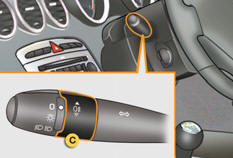
Model with front foglamps and a rear foglamp
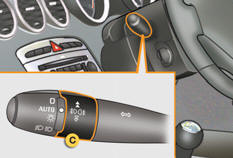
C. Foglamp selection ring.
The foglamps operate with the dipped and main beam headlamps.
 Rear foglamp
Rear foglamp
To switch on the foglamp, turn the ring C forwards.
When the lighting is switched off automatically (with AUTO model), the foglamp and the dipped beam headlamps will remain on.
To switch off all of the lighting, turn the ring C rearwards.
 Front and rear foglamps
Front and rear foglamps
Rotate and release the ring C :
forwards a first time to switch on the front foglamps,
forwards a second time to switch on the rear foglamp,
rearwards a first time to switch off the rear foglamp,
rearwards a second time to switch of the front fog lamps.
When the lighting is switched off automatically (with AUTO model) or when the dipped headlamps are switched off manually, the foglamps and sidelamps will remain on.
Turn the ring rearwards to switch off the foglamps, the sidelamps will then switch off.
 In good or rainy weather, both
day and night, the front foglamps and the rear foglamp are prohibited. In these
situations, the power of their beams may dazzle other drivers.
In good or rainy weather, both
day and night, the front foglamps and the rear foglamp are prohibited. In these
situations, the power of their beams may dazzle other drivers.
They should only be used in fog or snow.
In these weather conditions, it is your responsibility to switch on the foglamps and dipped beam headlamps manually as the sunshine sensor may detect sufficient light.
Do not forget to switch off the front foglamps and the rear foglamp when they are no longer necessary.
 Switching off the lamps when the
ignition is switched off
Switching off the lamps when the
ignition is switched off
On switching off the ignition, all of the lamps turn off immediately, except for dipped beam if guide-me-home lighting is activated.
Switching on the lamps after the ignition is switched off
To reactivate the lighting control, rotate ring A to the "0" position - lamps off, then to the desired position.
On opening the driver's door a temporary audible signal warns the driver that the lighting is on.
The lamps, with the exception of the sidelamps, switch off automatically after a maximum duration of thirty minutes to prevent discharging of the battery.
 In some weather conditions (e.g. low temperature or humidity), the presence of misting on the internal surface
of the glass of the headlamps and rear lamps is normal; it disappears after the lamps have been on for a few minutes.
In some weather conditions (e.g. low temperature or humidity), the presence of misting on the internal surface
of the glass of the headlamps and rear lamps is normal; it disappears after the lamps have been on for a few minutes.
LED lamps
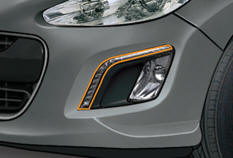
They come on when the engine is started.
Depending on the destination country, they are used for:
- daytime running lamps * in day mode and sidelamps in night mode (they are brighter when daytime running lamps),
or
- sidelamps in day and night mode.
Where LED lamps are fitted, the fi lament bulbs for the daytime running lamps / sidelamps in the front lamp units are not used.
* function that can be set in the vehicle configuration menu.
Daytime running lamps
Daytime lighting, compulsory in certain countries, which comes on automatically when the engine is started making the vehicle more visible to other users.
This function is assured:
- in countries where it is imposed by regulations, by illumination of the dipped beam headlamps with the sidelamps and number plate lamps; this function cannot be deactivated.
- for other countries where it is provided, by the use of dedicated lamps (bulbs or LEDs); this function can be activated or deactivated via the vehicle configuration menu.
The lighting control stalk must be placed in the "0" or "AUTO" (day mode) position.
Deactivation of the daytime running lamps is effective after operation of the lighting control stalk or after the next engine start; activation is effective immediately.
The instruments and controls (instrument panel, multifunction screen, air conditioning control panel, ...) are not illuminated, except in night mode with manual or automatic illumination of headlamps.
Manual guide-me-home lighting
Temporarily keeping the dipped beam headlamps on after the vehicle's ignition has been switched off makes the driver's exit easier when the light is poor.
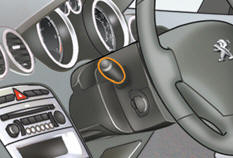
Switching on
With the ignition off, "fl ash" the headlamps using the lighting stalk.
A further "headlamp fl ash" switches the function off.
Switching off
The manual guide-me-home lighting switches off automatically after a set time.
Automatic illumination of headlamps
The sidelamps and dipped beam headlamps are switched on automatically, without any action on the part of the driver, when a low level of external light is detected or in certain cases of activation of the windscreen wipers.
As soon as the brightness returns to a sufficient level or after the windscreen wipers are switched off, the lamps are switched off automatically.
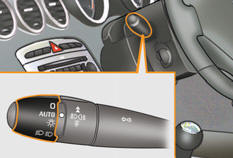
Activation
Turn ring to the "AUTO" position. The automatic illumination of headlamps is accompanied by a message in the screen.
Deactivation
Turn ring to a position other than "AUTO" . Deactivation is accompanied by a message in the screen.
Operating fault

In the event of a fault with the sunshine sensor, the lighting come on, this warning lamp is displayed in the instrument panel and/or a message appears in the screen, accompanied by an audible signal.
Contact a PEUGEOT dealer or a qualified workshop.
 In fog or snow, the sunshine sensor
may detect sufficient light. Therefore, the lighting will not come on automatically.
In fog or snow, the sunshine sensor
may detect sufficient light. Therefore, the lighting will not come on automatically.
Do not cover the sunshine sensor, coupled with the rain sensor and located in the centre of the windscreen behind the rear view mirror; the associated functions would no longer be controlled.
Automatic "Guide-me-home"
lighting
When the automatic illumination of headlamps functions is activated, if the ambient light level is low the dipped beams remain on when switching off the ignition.
Settings

Activation and deactivation, as well as the duration of the guide-me-home lighting can be set in the vehicle configuration menu.
Exterior welcome lighting
The remote switching on of the lighting makes your approach to the vehicle easier in poor light. It is activated according to the level of light detected by the sunshine sensor.
Switching on
Press the open padlock on the remote control.
The dipped beam headlamps and the sidelamps come on; your vehicle is also unlocked.
Switching off
The exterior welcome lighting switches off automatically after a set time, when the ignition is switched on or on locking the vehicle.
 The activation, deactivation and
duration of the welcome lighting are independant of the settings for the automatic
guide-me-hope lighting.
The activation, deactivation and
duration of the welcome lighting are independant of the settings for the automatic
guide-me-hope lighting.
See also:
Displays in the instrument panel
The programmed information is grouped together in the instrument panel screen.
5. Speed limiter on / off indication.
6. Speed limiter mode selection indication.
7. Programmed speed value.
8. Sel ...
1.6 litre e-hdi fa p 112 bhp engine
To deploy this technology on a large scale, the new Peugeot 308 proposes
e-HDi technology with a "basic" engine, the 1.6 litre HDi FAP 112 bhp, which can
be coupled with two gearboxes (m ...
Instruments and controls
1. Steering wheel adjustment control.
2. Cruise control / speed limiter switches.
3. Lighting and direction indicators control stalk.
4. Central adjustable air vents.
5. Head-up display.
6. Mul ...






